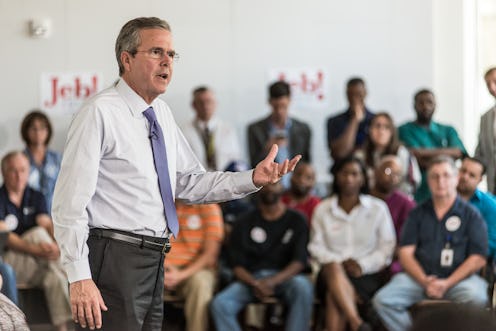News
Jeb Bush's Remarks To Black Voters Were Surprising
Jeb Bush has been lambasted by his colleagues on the right for being too moderate over the years, but that same political pushback may not always be such a bad thing, depending on Bush's audience. On Friday, the former Florida governor and 2016 presidential candidate took the stage in Fort Lauderdale, Fla., at a meeting with attendees of the annual National Urban League conference, to declare the "war on poverty" insufficient, citing the funneling of government financing into faulty programs as wasted efforts. Amidst the fervor of far right GOP candidates promising to slash government programs entirely, Bush's remarks to black voters were surprisingly optimistic.
"This decades-long effort, while well intentioned, has been a losing one," said Bush. "So many people could do so much better in life if we could come together and get even a few big things right in government."
He added that several of the nation's massive programs, "funded with trillions of taxpayer dollars," had failed, boasting of his own gubernatorial record as proof that he was the only candidate, GOP or otherwise, that was worth their vote.
"I acted on [those beliefs] as governor of Florida," Bush explained. "It's a record I'll gladly compare with anyone else in the field."
In attendance with Bush was Democratic front-runner Hillary Clinton, who told supporters of the nation's largest civil rights organization that racial discrimination still existed, despite the country's advancements over the past few decades.
"Race still plays a significant role in determining who gets ahead in America and who gets left behind," Clinton said. She added that "anyone running" for the office of president should be able to "grapple with" such "systemic inequities."
The two partisan heavyweights, who largely disagree on most topics, seemed to band together in that sentiment, with Bush also acknowledging the issue of racial inequality in his speech Friday, remarking on President Obama's eulogy at the funeral of Charleston shooting victim and former South Carolina State Sen. Clementa Pinckney:
[There are] unjust barriers to opportunity and upward mobility in this country. Some we can see, others are unseen but just as real. So many lives can come to nothing, or come to grief, when we ignore problems, or fail to meet our own responsibilities. [President Obama] was speaking the truth [when he said that] "for too long, we've been blind to the way past injustices continue to shape the present."
However, as Clinton pointed out on Friday, Bush's stances on other major issues cancelled out any credibility he may have stood to gain with black voters, including his opposition to government health care programs.
"I don't think you can credibly say that everyone has a 'right to rise' and then say you're for phasing out Medicare or for repealing Obamacare," said Clinton, taking aim at Bush's campaign slogan. "People can't rise if they can't afford health care."
While Clinton's comments were likely a way to distance herself from the GOP candidate and maintain her base of more left-wing voters (who could potentially swing in rival Bernie Sanders' direction if Clinton isn't careful), the former Secretary of State did open up an important line of questioning.
Right-wing conservatives have been more than eager to paste a progressive label on Bush and push him to the sidelines in favor of Tea Party candidates in the past, and Bush's comments to Urban League voters did little change that. Some in his own party, however, have challenged that assertion. Despite the fact that Bush often plays himself off as centrist — which he certainly did on Friday with his promising comments to black voters — his own early record as Florida governor points in the exact opposite direction.
"Having lived in Florida while Bush was governor, however, I find it curious — if not specious — that the 'moderate' label is gaining any traction as it was clear that during his tenure in office, Bush was a true conservative," wrote trial lawyer and former Republican adviser Chuck Hobbs, in an op-ed column for The Hill back in May. With his elimination of affirmative action policies detrimental to minority-run businesses who were contracted with state institutions, and his restructuring of educational boards, which threw predominantly non-white schools into financial jeopardy, said Hobbs, Bush's stance on the black and minority communities, at the time at least, was evident.
"Bush was no moderate pragmatist on certain core issues crucial to blacks," added Hobbs. "Rather, he was wedded to core conservative viewpoints that comprised — then and now — the Manichean view of the modern Republican Party, one that draws rigid lines in the sand between conservative and progressive thought with little room for nuance."
Bush's comments on Friday, then, served as little more than a non-sequitur in many voters' minds. But it also raised the important question of whether the 2016 hopeful had legitimately changed his views in a time when it had become impossible to ignore a rising tide of racial injustices. Bush himself was adamant on the latter, telling audience members on Friday that he had learned from the voices of minority communities in the past and promising to continue that trend if elected president.
"It made me a better person, a better candidate in 1998, and a better governor in the eight years that followed," said Bush. "That experience still shapes the way I see the deep-seated challenges facing people in urban communities today."
Images: Getty Images (3)
